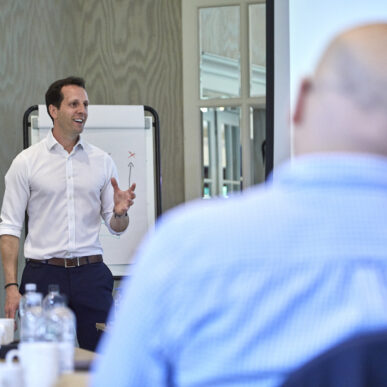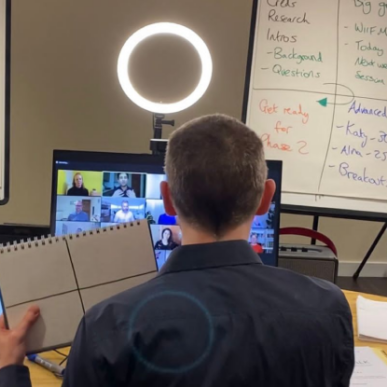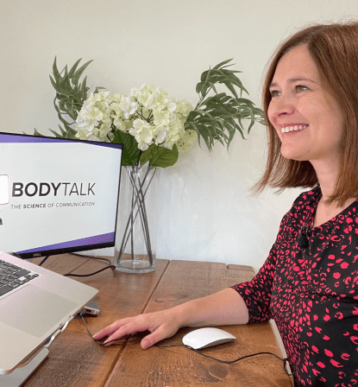How To Calm Down Before A Presentation
Emotions can seem like an overwhelming force of nature that can stop us from performing at our best. Knowing how to calm down before a presentation and adopt a peak performance mindset can help you to take control.
You can overcome fear, anxiety and a crushing lack of confidence by switching your mindset from feeling nervous to excited.
In fact, an experiment with milkshake labels gives us a glimpse into how this works.
Alia Crum, a psychologist at the University of Columbia decided to find out just how much our mindset contributes to our feelings. A group of hungry people were given a milkshake called ‘Sensishake’, labelled as having zero fat, zero sugar and only 140 calories. Their ghrelin (hunger hormone) levels were tested before and after they drank it, and barely changed. Their bodies still felt hungry.
The following week, the same people tried another milkshake called ‘Decadence You Deserve’. The label showed 56g of sugar, 30g of fat and 620 calories! This time, their ghrelin levels dropped significantly, taking their hunger feelings away. The surprise? It was the same drink each time, just with a different label.
The experiment proved that we can control how we feel by changing what we focus on.
We can apply this theory to the anxiety or nervousness we feel before giving a big presentation. By switching focus from poor-state experiences to peak-state experiences, we can walk into a presentation feeling powerful and confident instead of nervous or unsure.
Why do people get nervous before presenting?
If you’re nervous about speaking in public, you’re not alone. Studies have shown that fear of public speaking is more common than fear of heights, flying and even spiders! So why do we feel this way when we’re in the spotlight?
The nerves that we feel before a big presentation are part of our ‘fight or flight’ reaction that comes from being watched. In prehistoric times, being watched by a predator was a potentially life-threatening situation, so our instinctive reaction is to be on high alert for danger.
Today, we still experience those feelings of threatening situations when eyes are on us: we may be fearful of making a mistake and looking stupid, we don’t want to be embarrassed or judged negatively. We may feel imposter syndrome, or that everyone else knows what they are doing except us.
These anxieties are common but have a strong, negative emotional influence on us, and can often be self-fulfilling. If we convince ourselves something is going to go badly, then it’s more likely to happen.
Our top tips for public speaking
So what can you do to calm your nerves before or during a presentation? Here are some of our top tips for nervous presenters:
Draw upon similar experiences
One way to calm down before a presentation is to draw upon experiences that you’ve had where things have gone well. This is sometimes referred to as controlling your “Monkey Mind” – the emotional part of the brain that wants you to feel safe. Controlling it is one of the most important things you learn as a public speaker
Your “Monkey Mind” will get scared when it notices you’re anxious, and so in order to help you avoid more pain, it’ll focus on memories of other situations where you felt stressed and replay them. It’s doing this instinctually.
So, if you want to avoid the anxiety from spiralling out of control, you have to give the monkey something better to watch.
When you have an important event coming up and you start to feel anxious, you can think back to moments when you felt in a peak state — meaning you were feeling at your absolute best.
Ideally, in my experience, it works best if you replay an event that is similar to the one you are about to be in. If I am about to speak to a group of 100 people sitting at round tables, I search my memories for the same kind of situation that went well.
If you don’t have any similar memories to draw from then get as close as you can, and over time you’ll have more positive experiences to leverage against your monkey mind.
Remember the last time you felt powerful
There will be times when you’re caught in a totally new experience and you won’t have similar experiences to pull from.
That’s okay — you don’t need them. Instead, you can think about other instances in which you felt your best.
Essentially, you need to give your “Monkey Mind” something reassuring, empowering and inspiring to replay. Add one event on top of another event. Add more events whenever you have a peak state experience so the monkey will have more to watch.
What this does is it brings to the front of your mind all the feelings associated with that accomplishment or empowerment. You’ll be tricking your brain into feeling calmer, more confident, maybe even a little euphoric. And then as you step into your big meeting or presentation, you’ll be taking those feelings with you.
Centre on the best version of yourself
Another way to calm down before a presentation is by focusing on yourself and your deep personal values. What do you care about? What’s important to you? What drives you to do what you do?
A psychological experiment at the University of California proved just how impactful our personal values can be. A team of psychologists tested stress responses in participants who were asked to complete a series of problem-solving tasks under time pressure and with evaluators giving feedback such as “I need you to try harder.”
Before the tasks, some of the participants were asked to rank a set of personal values such as relations with friends and family, creativity, independence and money, and then write about the one that was most important to them. The other group was told to choose their lowest ranked person value and write about why that might be important to others.
The participants’ cortisol levels were tested at various stages of the experiment. The results showed that the participants who had written about their own personal values had significantly lower cortisol responses than the control group. The findings suggest that reflecting on personal values can keep neuroendocrine and psychological responses to stress at low levels.
Essentially, by focusing on your core personal values, you can stay in a peak state when you need to, centered in the best version of yourself.
By focusing on your best self, you’ll move through the world with renewed confidence and a better understanding of how to conquer obstacles in your path. Your speaking will blossom and you’ll feel more in control of your emotions.
Focus on your body language
Changing your body language can actually help you to calm down before a presentation.
When people are nervous, the adrenaline starts pumping and they start to move around – a lot! They’ll move their arms if they’re sitting down or they’ll tap their foot up and down. They might start to walk around for no reason and with no direction. This can be distracting for your audience, and is also an outward sign that you’re nervous or uncomfortable.
To settle the adrenaline, it’s much better to focus on stillness. By keeping your body still, you will send signals to your mind that you’re in a safe situation. This will help you to shift away from the anxiety and move towards a feeling of being settled. And you’ll look more confident to boot.
Control your breath
You may have heard the advice that to calm down before a presentation you should just “take a deep breath!”
Unfortunately, this doesn’t work. Taking a deep breath in makes you breathe in to your upper chest. This increases a feeling of tension and anxiety. Instead, if you’ve got anxiety, heart palpitations or a quivering voice, focus on breathing out. This will allow you to start diaphragmatic breathing, which will calm your heart rate and keep your voice calm.
When you’re preparing to get up and speak, just silently focus on breathing outwards and pushing the air out of your lungs.
Transform your presentations with our help
Whether you want further advice on how to calm down before a presentation or bespoke coaching to help you achieve your peak performance mindset, we’re here to help. To learn more about how we can help you please contact our team.




















